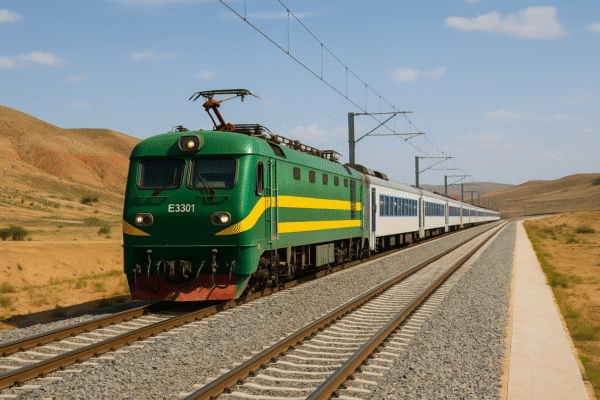The Ethiopia-Djibouti Standard Gauge Railway (EDR) continues to serve as a transformative infrastructure project that is reshaping not only trade and logistics in East Africa but also opening new doors for tourism, cultural exchange, and regional connectivity. Connecting Addis Ababa, the Ethiopian capital, with Djibouti’s strategic port city, this 752-kilometer electrified railway—Africa’s first transnational electric rail line—is revolutionizing how people and goods move across borders.
A Symbol of African Infrastructure Renaissance
Launched under China’s Belt and Road Initiative (BRI), the Ethiopia-Djibouti Railway marks a turning point for African countries seeking modern, sustainable transport solutions. Built with the technical assistance of Chinese firms and co-financed by the governments of Ethiopia, Djibouti, and Chinese banks, the railway represents an ambitious step towards continental integration.
According to the Ethiopian Ministry of Transport and Logistics, the railway is more than a freight carrier—it’s a vital part of Ethiopia’s transport master plan. Serving as a central artery in Ethiopia’s broader logistics corridor, it offers a dependable and fast route for both goods and passengers.
Enhancing Trade, Fueling Tourism
The EDR was initially designed to transport 2 million tonnes of freight annually, but that figure is expected to more than triple to 6.2 million tonnes by 2027, as confirmed by the Ethio-Djibouti Railway Share Company (EDRSC). Today, nearly 90% of Ethiopia’s maritime trade flows through Djibouti’s ports, and the railway is now handling around 25% of this volume.
While freight movement remains its core function, the railway is increasingly seen as a gateway for East African tourism. Comfortable passenger coaches equipped with modern amenities allow tourists to travel seamlessly from Ethiopia’s highlands to Djibouti’s coastal deserts. The route offers spectacular vistas—from the rugged Ethiopian terrain to the coastal plains of Djibouti—making it a viable scenic rail journey for eco-tourists and adventure seekers.
The governments of both nations have announced plans to further develop tourism infrastructure along the railway corridor, including rest stops, eco-lodges, and local artisan markets near major stations like Dire Dawa and Ali Sabieh. This initiative is supported by the African Union’s Agenda 2063, which encourages infrastructure-driven tourism development.
Multimodal Capabilities Transform Logistics Landscape
In a landmark move in 2025, the EDRSC obtained a Multimodal Transport Operation (MTO) license, allowing it to expand its services to warehousing, customs clearance, containerization, and door-to-door freight services. This has made the Ethiopia-Djibouti Railway a fully integrated logistics backbone for landlocked Ethiopia, which heavily relies on Djibouti for port access.
The railway’s efficiency is already reflected in its economic indicators. Over the last six years, transportation revenue has surged by 39%, underlining growing user trust and increasing reliance on rail over road transport, which is more vulnerable to delays and fuel price shocks.
A Bridge of Bilateral Harmony
More than just a commercial enterprise, the railway is a living testament to the strong diplomatic ties between Ethiopia and Djibouti. As emphasized by Ethiopia’s Finance Minister Ahmed Shide, the trilateral cooperation between Ethiopia, Djibouti, and China offers a replicable model for regional development based on mutual benefit and shared vision.
This partnership extends beyond trade and infrastructure. Regular cultural events, bilateral tourism forums, and educational exchanges are being organized as part of the Ethio-Djibouti Railway development plan to foster people-to-people diplomacy. Plans are underway to establish cross-border travel visas to encourage tourism and streamline travel between the two nations.
Challenges and Future Prospects
Like many transnational projects, the railway faces operational and administrative challenges. Maintenance costs, language barriers among staff, and cross-border coordination are being gradually addressed through capacity-building programs and digitalization.
Looking ahead, there are plans to connect the railway with other regional transport corridors, potentially linking to the Lamu Port-South Sudan-Ethiopia Transport (LAPSSET) Corridor, creating a continental trade and tourism belt stretching from the Red Sea to the Indian Ocean.
Furthermore, the African Continental Free Trade Area (AfCFTA) presents a significant opportunity. With tariff reductions and common market frameworks, the Ethiopia-Djibouti Railway is poised to become a preferred route for intra-African trade and travel, bolstering not just regional but continental growth.
Conclusion
The Ethiopia-Djibouti Railway is more than steel and concrete—it’s a catalyst for economic dynamism, regional unity, and sustainable tourism in East Africa. As it expands both in capacity and services, the railway stands as a glowing example of what smart infrastructure investment and international cooperation can achieve.
For travelers, traders, and governments alike, the Ethiopia-Djibouti route is not just a railway; it’s a pathway to a more connected, prosperous, and mobile Africa.
For more travel news like this, keep reading Global Travel Wire



















